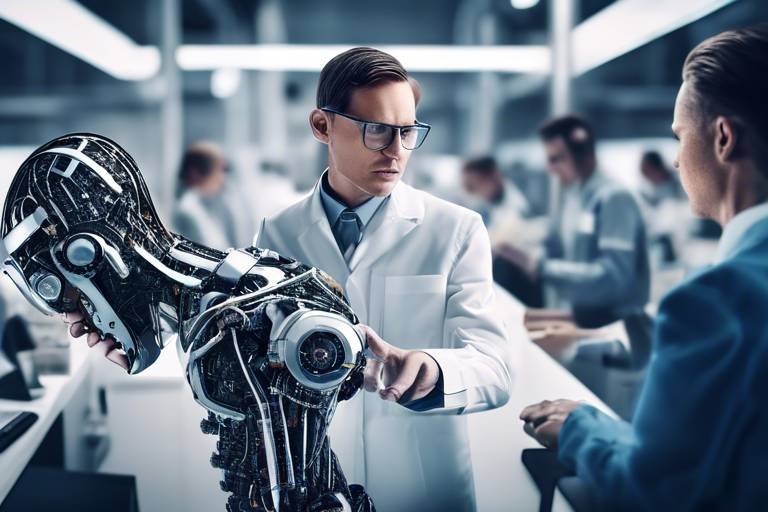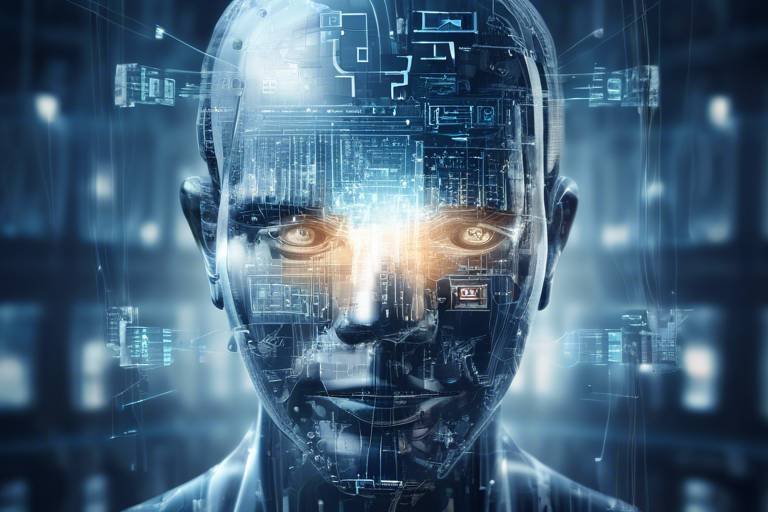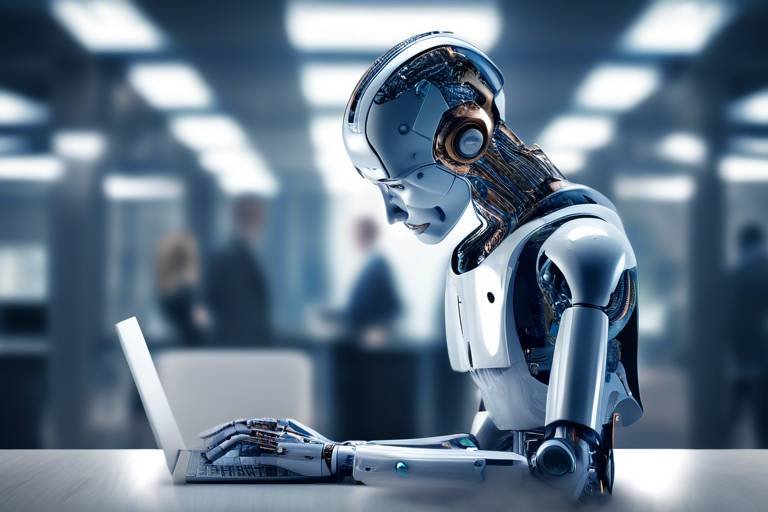AI and the Future Career Landscape: What to Expect?
Welcome to the age of artificial intelligence, where the future of work is being redefined at lightning speed! If you thought the job market was already a rollercoaster ride, just wait until you see how AI is shaking things up. From healthcare to finance, every industry is feeling the impact of these technological advancements. But what does this mean for you and your career? Are you ready to adapt to the changes that are coming your way? In this article, we'll dive deep into the exciting world of AI and explore how it's transforming the career landscape, the skills you'll need to thrive, and the ethical considerations that come along with it.
As AI continues to evolve, it’s not just about robots taking over jobs; it’s about creating new opportunities that didn’t even exist a few years ago. Imagine a world where machines handle mundane tasks, allowing you to focus on creative problem-solving and innovation. Sounds appealing, right? But here's the catch: you need to be prepared to seize these new opportunities. Understanding how AI is reshaping various sectors is the first step in future-proofing your career.
In the upcoming sections, we’ll explore the rise of AI in different industries, the essential skills you’ll need to thrive in this new landscape, and the ethical implications of AI in the workplace. Whether you’re a recent graduate, a seasoned professional, or someone looking to switch careers, this guide is designed to equip you with the knowledge you need to navigate the future job market confidently. So, buckle up and get ready to explore the thrilling intersection of AI and your career!
AI is not just a buzzword; it’s a game changer that is transforming multiple sectors, including healthcare, finance, and manufacturing. For instance, in healthcare, AI algorithms are revolutionizing diagnostics, enabling doctors to make faster and more accurate decisions. Meanwhile, in finance, AI is streamlining processes like fraud detection and risk assessment, making transactions safer and more efficient. In manufacturing, AI-driven automation is enhancing productivity by optimizing supply chains and reducing operational costs.
Understanding these shifts is crucial for professionals who want to stay ahead of the curve. The sooner you grasp how AI is reshaping your industry, the better positioned you'll be to take advantage of new job opportunities. For example, roles that involve AI oversight, data analysis, and machine learning are on the rise. If you’re in a field that hasn’t yet embraced AI, now is the time to start learning about these technologies and how they can be integrated into your work.
As the landscape evolves, certain skills are becoming increasingly valuable. In the AI era, it's not just about having a degree; it's about possessing the right competencies. Are you ready to invest in your future? Here are some essential skills to focus on:
Proficiency in programming languages, data analysis, and machine learning is crucial for many roles. For instance, learning Python or R can give you an edge in data science positions, while understanding machine learning frameworks like TensorFlow can set you apart in tech-driven industries. These skills are not only in demand; they are becoming the foundation of many future careers.
While technical skills are important, don’t underestimate the power of soft skills. Attributes like communication, creativity, and emotional intelligence are equally vital. In an AI-integrated workplace, the ability to collaborate effectively and think critically is what will truly set you apart. After all, machines may be able to crunch numbers, but they can’t replicate the human touch. So, while you’re honing your technical skills, don’t forget to cultivate your interpersonal abilities!
The rapid pace of technological change necessitates lifelong learning. To stay relevant, you need to adapt continuously. Consider taking online courses, attending workshops, or even pursuing certifications in emerging technologies. The more proactive you are in your learning journey, the better equipped you’ll be to navigate the twists and turns of your career path.
The debate around AI often centers on job displacement. Yes, certain jobs may become obsolete, but it's essential to look at the bigger picture. AI is also creating new roles that require different skill sets. For example, as AI systems become more prevalent, there will be a growing need for professionals who can manage these technologies and ensure they are used ethically. So, rather than fearing job loss, consider how you can position yourself in the new job landscape.
As AI becomes more prevalent, ethical considerations in its application are crucial. Understanding the implications of AI technology is part of a responsible career in the future. Ethics will play a significant role in shaping job responsibilities and organizational practices.
AI systems can perpetuate biases if not properly managed. It’s essential to recognize and mitigate these biases to ensure fairness in hiring and workplace practices. By advocating for ethical AI practices, you can contribute to a more equitable workplace.
Trust is essential for the successful integration of AI in the workplace. Organizations need to implement strategies that foster trust among employees and clients regarding AI technologies. This could involve transparency in AI processes and ensuring that employees are trained to understand how these systems work.
- Will AI take away my job?
While AI may automate certain tasks, it also creates new opportunities that require different skills. - What skills should I focus on developing?
Technical skills like programming and data analysis are crucial, but don't forget about soft skills like communication and creativity. - How can I stay updated with industry trends?
Engage in continuous learning through online courses, workshops, and networking with professionals in your field.

The Rise of AI in Various Industries
This article explores the impact of artificial intelligence on future careers, discussing emerging trends, necessary skills, and how industries will adapt to technological advancements.
Artificial intelligence, or AI, is not just a buzzword anymore; it's a transformative force reshaping the very fabric of various industries. From healthcare to finance and even manufacturing, AI is making waves that are hard to ignore. Imagine walking into a hospital where AI algorithms assist doctors in diagnosing diseases faster than ever before. Or consider a financial institution where AI systems analyze market trends to predict stock movements with astonishing accuracy. This is not science fiction; it's happening right now! The rise of AI is creating a paradigm shift, and understanding these changes is crucial for professionals aiming to stay relevant in their fields.
In the healthcare sector, AI is revolutionizing patient care. With the ability to analyze vast amounts of medical data, AI can identify patterns that human eyes might miss. For example, AI-driven diagnostic tools can analyze medical images to detect early signs of cancer, leading to timely interventions. Moreover, virtual health assistants powered by AI are helping patients manage their health more effectively by providing personalized recommendations and reminders. This shift not only enhances patient outcomes but also allows healthcare professionals to focus on more complex cases that require human empathy and judgment.
Meanwhile, in the finance industry, AI is streamlining operations and enhancing decision-making processes. Algorithms can process transactions and detect fraudulent activities in real time, making financial systems more secure. Additionally, AI-powered chatbots are improving customer service by providing instant responses to inquiries, thereby freeing up human agents to handle more complex issues. As a result, financial institutions are seeing increased efficiency and customer satisfaction, but they must also adapt to the changing landscape by investing in AI technologies and training their workforce accordingly.
Manufacturing is another sector where AI is making a significant impact. With the advent of smart factories, AI is optimizing supply chains and improving production processes. For instance, predictive maintenance powered by AI can foresee equipment failures before they occur, minimizing downtime and reducing costs. This technology not only boosts productivity but also ensures that workers can focus on more strategic tasks rather than routine maintenance. However, this shift also raises questions about job displacement, as some roles may become obsolete. Thus, the challenge lies in balancing technological advancement with workforce development.
To summarize, the rise of AI across various industries is not just a trend; it's a fundamental change that is here to stay. Professionals must embrace this evolution and prepare for the new opportunities and challenges it brings. By understanding how AI is reshaping their respective fields, individuals can position themselves for success in an increasingly automated world. As we move forward, it’s essential to keep an eye on these developments and adapt accordingly, ensuring that we harness the power of AI to enhance our careers rather than hinder them.
- How is AI changing the healthcare industry? AI is improving diagnostics, personalizing patient care, and streamlining operations.
- What role does AI play in finance? AI enhances fraud detection, automates customer service, and improves decision-making processes.
- Will AI lead to job losses? While some jobs may become obsolete, AI is also creating new roles that require different skill sets.
- What skills should I develop to work with AI? Focus on technical skills like programming and data analysis, as well as soft skills like communication and adaptability.

Essential Skills for the AI Era
As we stand on the brink of a technological revolution, it's clear that the skills required in the workforce are evolving at an unprecedented pace. The integration of artificial intelligence into various sectors is not just a trend; it's a fundamental shift that is reshaping how we work and what we need to know. So, what does this mean for you? To thrive in the AI era, professionals must cultivate a blend of technical and soft skills that will enable them to navigate this new landscape effectively.
First off, let's talk about technical skills. These are the hard competencies that will be in high demand as AI technologies become more prevalent. Proficiency in programming languages like Python or R, data analysis, and machine learning are crucial. Imagine being able to harness the power of AI to analyze vast amounts of data and draw actionable insights. This is not just a desirable skill; it's becoming a necessity in fields ranging from finance to healthcare. According to recent studies, over 60% of job postings in tech now require some level of data literacy. Therefore, investing time in learning these skills can significantly enhance your employability.
However, while technical skills are essential, they are not the whole picture. Enter the realm of soft skills. In a world where machines can perform many tasks, the human touch becomes incredibly valuable. Skills such as communication, creativity, and emotional intelligence will set you apart from the crowd. For instance, the ability to communicate complex ideas clearly and effectively can make a significant difference in collaborative environments where AI tools are used. Moreover, creativity is key in problem-solving and innovation—two areas where humans excel over machines. As AI takes over repetitive tasks, the demand for creative thinkers who can devise new solutions will soar.
Moreover, we cannot overlook the importance of continuous learning and adaptability. The rapid pace of technological change means that the skills you acquire today might not be relevant tomorrow. Adopting a mindset of lifelong learning is crucial for staying ahead. Whether it's through online courses, workshops, or self-study, committing to regular upskilling will prepare you for the challenges and opportunities that lie ahead. Embracing change and being willing to adapt your skill set will not only make you more resilient but also more attractive to potential employers.
In summary, as we transition into an AI-driven future, the combination of technical prowess and soft skills will be the cornerstone of a successful career. The ability to analyze data, program intelligently, and communicate effectively will be indispensable. At the same time, don't underestimate the power of human qualities like creativity and emotional intelligence. They will be the differentiators in a world increasingly dominated by technology. So, are you ready to equip yourself with these essential skills for the AI era?
- What technical skills should I focus on for AI-related jobs?
Focus on programming languages like Python, data analysis, and machine learning techniques. Understanding AI frameworks can also be beneficial.
- Are soft skills really that important in an AI-driven workplace?
Absolutely! Skills like communication, creativity, and emotional intelligence are crucial for collaboration and innovation.
- How can I keep my skills updated in a rapidly changing environment?
Engage in continuous learning through online courses, attend workshops, and stay informed about industry trends to adapt your skills accordingly.

Technical Skills in Demand
In today's rapidly evolving job market, the demand for technical skills has reached unprecedented levels. As artificial intelligence (AI) continues to reshape industries, professionals must equip themselves with specific competencies to stay relevant. Proficiency in programming languages, data analysis, and machine learning are no longer optional; they are essential for anyone looking to thrive in an AI-driven environment. But what does this really mean for you? Let’s break it down.
Firstly, programming is at the core of AI technology. Languages such as Python, Java, and R are widely used for developing AI applications. Python, in particular, has gained immense popularity due to its simplicity and vast libraries like TensorFlow and PyTorch, which facilitate machine learning and deep learning projects. Imagine being a chef who knows how to use every tool in the kitchen; that’s what programming proficiency offers you in the tech world—an ability to create and innovate.
Next up is data analysis. In a world where data drives decisions, the ability to interpret and analyze data sets is invaluable. Professionals skilled in tools like SQL, Excel, and data visualization software such as Tableau or Power BI are in high demand. Companies are drowning in data but starving for insights. If you can turn raw numbers into actionable strategies, you’ll be the life raft they’re looking for.
Machine learning is another crucial area where expertise is sought after. Understanding algorithms and how to implement them can set you apart from the crowd. This involves not just knowing how to use machine learning frameworks but also grasping the underlying principles that govern them. Think of it as being able to not just drive a car but also understanding how the engine works. This depth of knowledge allows you to troubleshoot and innovate effectively.
To give you a clearer picture, here’s a table summarizing the key technical skills and their relevance:
| Technical Skill | Description | Industry Relevance |
|---|---|---|
| Programming (Python, Java) | Creating and managing AI applications | Software Development, Data Science |
| Data Analysis (SQL, Excel) | Interpreting and visualizing data | Business Intelligence, Marketing |
| Machine Learning | Implementing algorithms for predictive modeling | Tech, Finance, Healthcare |
Now, while technical skills are crucial, they are just part of the equation. The reality is that the most successful professionals will combine these skills with a strong understanding of their industry and an ability to adapt to new technologies as they emerge. The tech landscape is like a river that never stops flowing; if you want to stay afloat, you need to keep swimming. So, are you ready to dive in and refine your technical skills?
- What programming languages should I learn for AI? Python is highly recommended due to its versatility and extensive libraries.
- Is data analysis important in AI? Absolutely! Data analysis helps translate data into actionable insights, a critical component in AI projects.
- Do I need to know machine learning to work in AI? While it's beneficial, foundational knowledge in programming and data analysis can also lead to various roles in AI.

Soft Skills: The Human Touch
In a world increasingly dominated by artificial intelligence, the importance of soft skills cannot be overstated. While technical prowess and knowledge of AI tools are undoubtedly valuable, it is the human touch that truly sets individuals apart in the workplace. Imagine a scenario where a highly skilled programmer is paired with a teammate who excels in communication and empathy. Who do you think would be better at leading a team through a challenging project? That's right—the one who can connect with people on a personal level.
Soft skills encompass a variety of attributes, including communication, creativity, emotional intelligence, and collaboration. These traits are essential for working effectively in teams, resolving conflicts, and fostering a positive work environment. For instance, when AI systems are implemented in a workplace, employees will need to communicate their experiences, concerns, and suggestions. This is where strong communication skills come into play. The ability to articulate thoughts clearly and listen actively can make or break a team's success.
Moreover, creativity becomes a crucial differentiator in an AI-driven landscape. While machines can process data and generate outputs, they lack the ability to think outside the box. This is where human creativity shines. Consider the role of a marketing professional who must devise innovative campaigns to engage audiences. The ability to brainstorm unique ideas and adapt to changing consumer preferences is something only a human can bring to the table.
Emotional intelligence, or the ability to understand and manage one's own emotions while empathizing with others, is another vital soft skill. In an era where AI can analyze data patterns, it cannot replicate the nuanced understanding of human emotions. Employees with high emotional intelligence can navigate workplace dynamics more effectively, foster collaboration, and create an inclusive environment. This is particularly important when AI technologies are introduced, as employees may feel uncertain or threatened by the changes. A leader with emotional intelligence can help ease these fears and guide the team through transitions.
In summary, while technical skills are essential for navigating the AI landscape, it is the soft skills that will truly enable professionals to thrive. As industries continue to evolve, organizations will increasingly value individuals who can blend technical knowledge with interpersonal abilities. So, invest in your soft skills, and remember that the human touch is irreplaceable in a tech-driven world.
- What are soft skills? Soft skills are personal attributes that enable someone to interact effectively and harmoniously with other people.
- Why are soft skills important in the age of AI? As AI handles more technical tasks, soft skills become crucial for human interaction, creativity, and emotional intelligence in the workplace.
- Can soft skills be developed? Yes, soft skills can be developed through practice, training, and real-world experiences.
- How can I improve my soft skills? Engaging in activities like team sports, volunteering, or taking part in workshops can help enhance your soft skills.

Continuous Learning and Adaptability
In today's fast-paced world, the only constant is change. With the rapid advancements in technology, particularly in artificial intelligence, the need for continuous learning and adaptability has never been more critical. Imagine trying to navigate a ship in turbulent waters without a compass—this is what it feels like for professionals who resist learning new skills or adapting to new technologies. To thrive in the AI era, individuals must embrace a mindset that prioritizes lifelong learning. This means being open to new ideas and willing to step outside of your comfort zone.
So, how can one effectively cultivate this mindset? First, it’s essential to identify the areas where you need to grow. Are you familiar with data analysis? Do you understand the basics of machine learning? If not, it’s time to seek out resources that can help fill those gaps. Online platforms like Coursera, Udacity, and LinkedIn Learning offer a plethora of courses tailored to various skill levels. Additionally, attending workshops, webinars, and industry conferences can provide invaluable insights and networking opportunities.
Moreover, adaptability goes hand in hand with continuous learning. The ability to pivot when faced with new challenges is a skill that employers highly value. For instance, if your company adopts a new AI tool that changes the way tasks are completed, being adaptable means you can quickly learn how to use that tool effectively instead of resisting it. It’s like being a chameleon; the more you can blend into your environment, the better your chances of survival and success.
Organizations also play a crucial role in fostering a culture of continuous learning. Companies that encourage their employees to pursue further education and provide resources for skill development are more likely to stay competitive in the marketplace. This can be achieved through:
- Offering tuition reimbursement programs
- Creating mentorship opportunities
- Facilitating access to online courses and training materials
In conclusion, as we move deeper into the AI era, the importance of continuous learning and adaptability cannot be overstated. By committing to ongoing education and being flexible in the face of change, professionals can not only enhance their own career prospects but also contribute positively to their organizations. Remember, the journey of learning is never truly complete; it’s a lifelong adventure that opens doors to new opportunities and experiences.
- Why is continuous learning important in the AI era? Continuous learning is essential because technology is evolving rapidly, and staying updated ensures that professionals remain relevant and competitive in their fields.
- How can I start my journey of continuous learning? You can begin by identifying skills that need improvement, enrolling in online courses, attending workshops, and seeking mentorship opportunities.
- What are some effective ways to adapt to new technologies? Embrace a positive mindset towards change, practice using new tools, and engage in discussions with colleagues who are familiar with the technologies.

Job Displacement vs. Job Creation
The conversation surrounding artificial intelligence (AI) often ignites a fiery debate about its potential to displace jobs versus its capacity to create new ones. It's like watching a game of tug-of-war, where on one side, you have workers concerned about losing their roles to machines, and on the other, you have advocates highlighting the new opportunities that AI can bring. So, what's the real story? Are we on the brink of a job apocalypse, or is this merely the dawn of a new era filled with innovative roles?
Let's face it: AI is undeniably transforming the labor market. While it's true that certain jobs, particularly those involving repetitive tasks, are at risk of being automated, this doesn't mean that the job market is shrinking. In fact, a report by the World Economic Forum predicts that by 2025, AI could displace 85 million jobs, but it could also create 97 million new roles that require different skill sets. This is a classic case of evolution in action; just as technology has shifted the landscape in the past, it will continue to do so in the future.
Consider the example of manufacturing. As robots take over assembly line tasks, new positions are emerging in robotics maintenance, programming, and oversight. These roles require a different set of skills, but they also offer exciting opportunities for those willing to adapt. The key here is understanding that while some jobs may vanish, others are being born, often in fields that didn't even exist a decade ago.
To illustrate this point, let's take a look at a table that highlights some industries likely to see both job displacement and creation:
| Industry | Jobs at Risk of Displacement | New Jobs Created |
|---|---|---|
| Manufacturing | Assembly line workers, quality control inspectors | Robot maintenance technicians, AI system trainers |
| Retail | Cashiers, stock clerks | Customer experience specialists, data analysts |
| Healthcare | Radiologists, medical transcriptionists | Telemedicine coordinators, AI health consultants |
This table highlights that while some traditional roles are being phased out, new opportunities are surfacing, often requiring a blend of technical knowledge and soft skills. The challenge lies in bridging the gap between current skills and the competencies needed for these emerging roles. For instance, a cashier may need to transition into a customer experience specialist, which requires not just understanding technology but also honing interpersonal skills.
Moreover, the implications of job displacement and creation extend beyond individual roles; they impact entire industries and economies. As companies integrate AI, they may streamline operations, leading to increased productivity and, potentially, growth. This growth can foster job creation in unexpected sectors, creating a ripple effect throughout the job market. It’s like planting a seed: while some plants may wither, others will bloom spectacularly.
In conclusion, the narrative of job displacement versus job creation in the age of AI is not a straightforward one. Yes, some jobs will be lost, but many more will emerge, often in areas we can't yet imagine. The key takeaway is that adaptability and a willingness to learn will be crucial for workers navigating this evolving landscape. By embracing change and focusing on skill development, individuals can position themselves to thrive in this new world of work.
- Will AI take away all jobs? No, while AI may automate certain tasks, it will also create new roles that require human skills.
- What skills should I develop to remain competitive? Focus on both technical skills like programming and data analysis, as well as soft skills like communication and emotional intelligence.
- How can I adapt to changes in the job market? Continuous learning and being open to new opportunities are essential for adapting to the evolving job landscape.

The Importance of AI Ethics in Careers
As we navigate through the ever-changing landscape of artificial intelligence, the importance of ethics in AI applications cannot be overstated. With AI technologies becoming integral in various industries, the ethical implications of their use directly impact job responsibilities and organizational practices. So, what does this mean for the future workforce? It means that understanding and implementing ethical guidelines is not just a responsibility but a necessity for professionals across all fields. Imagine a world where AI systems make decisions without considering ethical boundaries; the consequences could be disastrous, leading to biased hiring practices, privacy violations, and even discrimination.
Incorporating ethics into AI is about more than just compliance; it’s about fostering a culture of trust and accountability. Companies that prioritize ethical AI practices are not only protecting their employees but also enhancing their brand reputation in the marketplace. For instance, organizations that actively work to mitigate biases in their AI systems are likely to attract a more diverse talent pool. This is because candidates today are increasingly aware of and concerned about the ethical implications of the technologies they engage with. They want to work for companies that share their values and commitment to fairness.
To illustrate the importance of AI ethics, consider the following table that outlines key ethical considerations and their implications for careers:
| Ethical Consideration | Implication for Careers |
|---|---|
| Bias in AI Algorithms | Can lead to unfair hiring practices, affecting diversity and inclusion in the workplace. |
| Data Privacy | Professionals must navigate the complexities of data handling to protect sensitive information. |
| Transparency | Employees need to understand how AI systems make decisions to build trust and accountability. |
| Accountability | Organizations must establish clear guidelines on who is responsible for AI-driven decisions. |
Furthermore, the role of ethics in AI extends beyond individual companies; it shapes entire industries. As AI technologies continue to evolve, regulatory bodies and industry leaders are beginning to set standards and frameworks to guide ethical AI use. This means that professionals will need to stay informed about these developments and adapt their practices accordingly. Being proactive in understanding AI ethics can set you apart in the job market, making you a valuable asset to any organization.
In conclusion, as AI becomes increasingly prevalent in our careers, the need for ethical considerations will only grow. Professionals must engage with these issues to ensure that the technologies they work with contribute positively to society. By prioritizing ethics in AI, we not only enhance our workplace environments but also pave the way for a more equitable future.
- Why is AI ethics important? AI ethics is crucial because it ensures that AI technologies are used responsibly, promoting fairness and accountability.
- How can professionals stay informed about AI ethics? Professionals can stay updated through workshops, online courses, and industry publications focused on ethical AI practices.
- What are some examples of ethical issues in AI? Common ethical issues include bias in algorithms, data privacy concerns, and the need for transparency in AI decision-making.
- How does AI ethics impact hiring practices? Ethical considerations can lead to fairer hiring practices by addressing biases in AI systems used for recruitment.

Understanding Bias in AI
Artificial Intelligence (AI) has the potential to revolutionize industries and streamline processes, but it comes with a significant caveat: bias. Bias in AI can manifest in various forms, often stemming from the data used to train these systems. When AI algorithms are fed biased data—whether intentionally or unintentionally—they can produce skewed results that perpetuate existing inequalities. For instance, if a hiring algorithm is trained on historical data that reflects gender or racial biases, it may unfairly disadvantage certain candidates, leading to a lack of diversity in the workplace.
Recognizing and mitigating bias in AI is crucial for ensuring fairness and equity in decision-making processes. This involves a multi-faceted approach that includes:
- Data Diversity: Ensuring that the data used to train AI systems is representative of the entire population, including various demographics.
- Regular Audits: Conducting periodic reviews of AI systems to identify and rectify any biases that may have emerged over time.
- Transparency: Making AI algorithms more transparent so that stakeholders can understand how decisions are made and challenge them if necessary.
Moreover, it’s essential to involve a diverse group of people in the development and implementation of AI technologies. This diversity can lead to a broader perspective on potential biases and help create more inclusive AI systems. By doing so, organizations can foster an environment where AI serves as a tool for empowerment rather than discrimination.
To illustrate the impact of bias in AI, consider the following table that highlights various sectors affected by biased AI systems:
| Sector | Example of Bias | Potential Consequences |
|---|---|---|
| Hiring | Gender bias in recruitment algorithms | Reduced diversity in the workplace |
| Criminal Justice | Racial bias in predictive policing | Over-policing of minority communities |
| Healthcare | Bias in health risk assessment tools | Disparities in treatment recommendations |
As we move forward in an AI-driven world, it’s imperative to prioritize ethical considerations and actively work against bias. This not only enhances the credibility of AI technologies but also builds trust among users and stakeholders. By understanding and addressing bias in AI, we can create systems that are not only efficient but also fair and just.
- What is bias in AI?
Bias in AI refers to systematic favoritism or prejudice in the algorithms that can lead to unfair outcomes based on race, gender, or other characteristics. - How can bias in AI be mitigated?
Bias can be mitigated by using diverse datasets, conducting regular audits, and ensuring transparency in AI systems. - Why is addressing bias in AI important?
Addressing bias is crucial for ensuring fairness, equity, and trust in AI applications, particularly in sensitive areas like hiring and law enforcement.

Building Trust in AI Technologies
In today's rapidly evolving technological landscape, the integration of Artificial Intelligence (AI) into various workplace environments is not just a trend; it's becoming a fundamental aspect of how businesses operate. However, with great power comes great responsibility, and ensuring that employees and clients trust these AI technologies is paramount. Trust is the bedrock upon which successful AI implementation is built. Without it, even the most advanced AI systems can falter, leading to skepticism and resistance among users.
So, how can organizations foster this trust? One key strategy is transparency. By being open about how AI systems work, the data they use, and the decision-making processes they follow, companies can demystify AI. For example, organizations might consider implementing the following practices:
- Clear Communication: Regularly update employees and clients about AI capabilities and limitations.
- Involvement in Development: Engage stakeholders in the AI development process to gather feedback and address concerns.
- Data Privacy Assurance: Clearly outline how data is collected, used, and protected to alleviate privacy concerns.
Another essential aspect is education. Providing training sessions that equip employees with a solid understanding of AI technologies can significantly enhance their confidence in these systems. When individuals comprehend how AI assists in their daily tasks, they are more likely to embrace it rather than fear it. Consider offering workshops or online courses that cover various facets of AI, from basic concepts to advanced applications.
Moreover, organizations should prioritize the ethical implications of AI use. Implementing robust ethical guidelines that govern AI practices is crucial. This involves not just preventing bias in AI algorithms but also ensuring that the technology is used fairly and responsibly. Companies can establish an ethics committee that regularly reviews AI applications and their impact on both employees and clients.
Additionally, fostering a culture of accountability can further enhance trust. When AI systems make decisions, there should be a clear process for understanding how those decisions were reached. This means creating audit trails that allow for the review of AI actions and decisions. By being accountable, organizations can reassure stakeholders that AI is not just a black box but a tool that operates under human oversight.
Finally, it’s vital to build relationships with users. Engaging with employees and clients through surveys or feedback sessions can provide valuable insights into their experiences with AI technologies. Listening to their concerns and addressing them promptly can create a sense of partnership in the AI journey. After all, trust is not built overnight; it requires ongoing effort and commitment.
In summary, building trust in AI technologies is a multifaceted challenge that requires transparency, education, ethical considerations, accountability, and strong relationships. As we navigate this AI-driven future, organizations that prioritize these elements will not only enhance their operational efficiency but also cultivate a loyal and engaged workforce.
- What are the main factors that contribute to trust in AI?
Transparency, education, ethical practices, accountability, and user engagement are crucial for building trust in AI technologies.
- How can organizations ensure that their AI systems are ethical?
By establishing ethical guidelines, conducting regular audits, and involving diverse stakeholders in the AI development process.
- Why is transparency important in AI?
Transparency helps demystify AI systems, allowing users to understand how decisions are made, thus fostering trust and acceptance.
- What role does education play in building trust in AI?
Education empowers users with knowledge about AI, making them more confident in using the technology and reducing fear of the unknown.
Frequently Asked Questions
- How is AI impacting job opportunities?
AI is reshaping the job landscape by automating routine tasks and creating new roles that require advanced skills. While some jobs may become obsolete, new opportunities in AI management, data analysis, and technology development are emerging, offering exciting prospects for those willing to adapt.
- What skills should I focus on to thrive in an AI-driven job market?
To remain competitive, you should prioritize developing both technical skills, such as programming and data analysis, and essential soft skills like creativity and emotional intelligence. This combination will make you a valuable asset in workplaces increasingly integrated with AI technologies.
- Will AI lead to job displacement?
Yes, AI may displace certain jobs, particularly those that involve repetitive tasks. However, it will also create new roles that require different skill sets, leading to a transformation rather than a complete loss of jobs. Embracing continuous learning will be key to navigating these changes.
- What role does ethics play in AI careers?
As AI technologies become more prevalent, ethical considerations are crucial. Professionals must understand the implications of AI applications, including bias and fairness, to ensure responsible use in hiring and workplace practices. This awareness will guide future job responsibilities and organizational ethics.
- How can organizations build trust in AI technologies?
Organizations can foster trust by being transparent about how AI systems work and ensuring they are designed to be fair and unbiased. Providing employees and clients with proper training and resources will also help demystify AI technologies and promote a collaborative environment.



















